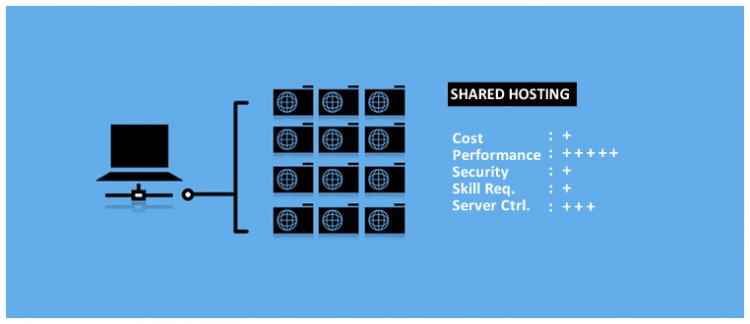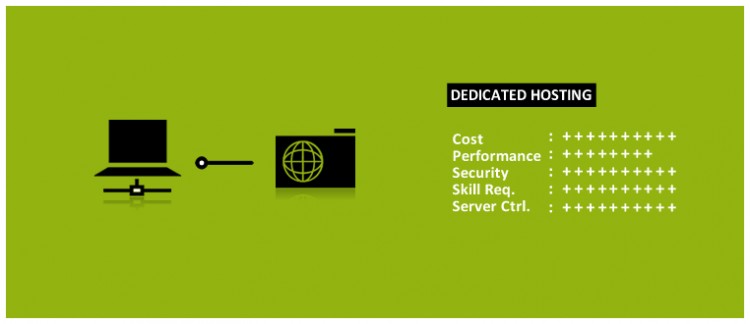Creating a website in 2017 is super easy. All it takes is these three simple steps.
1- Buy a domain
A domain is the name of your website. It has to be unique and convey the brand of your business. To get your own domain, you need to register it with a domain registrar.
Above are some reputable domain registrars to consider.
2- Order web hosting service
A web host is a big computer (aka, server) that stores your websites. Some giant companies – like Amazon, IBM, and FB, own and manage their web servers; other businesses simply rent their servers from a hosting provider (which is a lot more cheaper and easier).
Note: Skip this step if you are opting for a site builder to create your site (see step #3).
3- Create your website
Two methods to create your website easily: 1- using a content management system, and 2- using a site builder. You get more flexibility in designs and site functions with option 1; the creation and management process is much easier with option 2
For users who want to learn more – we have created this very detail guide (4,000+ words) to explain A-to-Z in creating, hosting, and managing a website.
By end of this guide, you should have fundamental understanding on how web hosting and domain names work; and how to build and host a website.
You can make use of the navigation menu (the grey box on the right of this page) to jump to the section you wish to read.
So… is your coffee mug filled? Let’s rock and roll!
1- What is a web host?
Web hosting is a place where people store their websites.
Think of it as a house where you store all your stuffs; but instead of storing your clothes and furniture, you store computer files (HTML, documents, images, videos, etc) in a web host.
More often than not, the term “web hosting” refers to the company that rent out their computer/servers to store your website and provide Internet connectivity so that other users can access to the files on your website.
Web Hosting And Data Center: Aren’t They The Same?
The term “web hosting” usually refers to the server that host your website or the hosting company that rent that server space to you.
Data center usually refers to the facility that is used to house the servers.
A data center could be a room, a house, or a very large building equipped with redundant or backup power supplies, redundant data communications connections, environmental controls – ie. air conditioning, fire suppression, and security devices.
2- Different Types of Web Hosting Servers
Generally, there are four different types of hosting servers: Shared, Virtual Private Server (VPS), Dedicated, and Cloud Hosting.
While all types of servers will act as a storage centre for your website, they differ in the amount of storage capacity, control, technical knowledge requirement, server speed, and reliability. Let’s dig in and look at the main differences between a shared, VPS, dedicated, and cloud hosting.
Shared Hosting
 In shared hosting, one’s web site is placed on the same server as many other sites, ranging from a few to hundreds or thousands. Typically, all domains may share a common pool of server resources, such as RAM and the CPU.
In shared hosting, one’s web site is placed on the same server as many other sites, ranging from a few to hundreds or thousands. Typically, all domains may share a common pool of server resources, such as RAM and the CPU.
As cost is extremely low, most websites with moderate traffic levels running standard software are hosted on this type of server. Shared hosting is also widely accepted as the entry level hosting option as it requires minimum technical knowledge.
Disadvantages- No root access, limited ability to handle high traffic levels or spikes, site performance can be affected by other sites on the same server.
Dedicated Server Hosting
 A dedicated server offers the maximum control over the web server your website is stored on – You exclusively rent an entire server. Your website(s) is the only website stored on the server.
A dedicated server offers the maximum control over the web server your website is stored on – You exclusively rent an entire server. Your website(s) is the only website stored on the server.
Disadvantages- With great power comes… well, greater cost. Dedicated servers are very expensive and it’s only recommended to those who need the maximum control and better server performance.
Virtual Private Server (VPS) Hosting
A virtual private server hosting divides a server into virtual servers, where each websites is like hosted on their own dedicated server, but they’re actually sharing a server with a few different other users.
The users may have root access to their own virtual space and better secured hosting environment with this type of hosting. Websites that need greater control at the server level, but don’t want to invest in a dedicated server.
Disadvantages- Limited ability to handle high traffic levels or spikes, your site performance can still be somewhat affected by other sites on the server.
Cloud Hosting
Cloud hosting offers unlimited ability to handle high traffic or traffic spikes. Here’s how it works: A team of servers (called a cloud) work together to host a group of websites. This allows multiple computers to work together to handle high traffic levels or spikes for any particular website.
Disadvantages- Many cloud hosting setup do not offers root access (required to change server settings and install some software), higher cost.
3- How to choose the right web host for your website
There are hundreds of questions that you could ask your potential web host, but by getting the answers to these questions before you sign on the dotted line, you should get a clear picture of what you will receive, what the provider offers long term, how they treat their customers, and if they are an organization you can trust and truly want to work with.
Questions to ask
“What is the average monthly uptime?”
Are you given any uptime guarantee in written agreement? The higher the uptime guarantee is, the better. With cloud technology, some hosting companies guarantee 100% uptime nowadays.
“How much does it cost?”
There is no point to go further if you are unable to afford the service.
“Where are the servers physically located? Can you choose your server location?”
A server closer to your users allows your website to load faster for them.
“What level of customer/ technical support are offered?”
See my recent investigation on hosting companies live chat support.
“What type of set-up assistance is included at no additional cost?”
Free site migration can be a huge time saver – especially if you are not familiar with servers / website hosting.
“What are the renewal terms and fees?”
Know that if you are a first-time subscriber, you will likely sign up at a discounted rate that the changes when you renew your contract – make sure that you know the full ramifications.
“What type of scalability potential is there?”
For example, if you start with a shared server plan, are you able to expand your space later or even switch to a dedicated server environment? Or does the provider you are considering specialize in one environment? Also, find out what are their server upgrade protocols. For example, are they able to update and upgrade their servers without downtime? If so, how? During what hours of the day/ night do they make those updates?
“What is the company’s policy if you need to change your hosting configuration mid-contract?”
For example, if you start out in a shared server configuration and need to move to a dedicated or VPS environment during your contract term, is that allowed? Are there penalties?
“If you are looking at an unlimited hosting plan, exactly what does that mean?”
All unlimited plans have limitations – it’s just a matter of what those limitations are.
“Does the hosting company offer a free trial?”
keep your eyes and ears open and take advantage of the no-commitment period to test every facet of the service.
How to choose the right web host for your website
Please visit for more information
http://qualitywebhosting.in or contact on 7506776850
